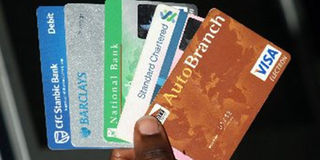Premium
Plastic money taking over cash in Kenya

An increasingly sophisticated consumer base is partly fuelling growth of plastic money use among Kenyans. Photo/FILE
A growing middle class in Kenya is increasingly using plastic money in place of cash.
A report by the Central Bank of Kenya shows a 22.06 per cent growth in the use of credit and debit cards.
From 5.5 million cards in June 2010 there were 8.6 million cards by June 2011.
Debit cards grew the fastest at 68.47 per cent to 7.0 million cards in June 2011. They make up 81 per cent of the cards.
This trend is opening up the card business to increased competition among banks as they position themselves for the business.
“Kenyans increasingly want to go plastic — an emerging middle class with disposable income,” said Chase Bank’s Magdalene Mulandi.
The value of transactions through cards up to June 2011 was Sh1.2 trillion.
Anticipating that the use of cards will continue to grow, MasterCard and Visa firms will open offices in Kenya.
A week ago, Chase Bank launched three MasterCard branded pre-paid cards known as Zawadi’, Traveler and Good Job.
All these point to an increasingly cashless society. Ms Mulandi believes that Kenyans merely need a push to cross over the threshold to plastic.
Barclays’ Nakumatt Visa Gold users earn Smartpoints while KCB’s Serena MasterCard gives holders discounts at all Serena hotels.
Mobile phone payment continues to dominate in Kenya and Mastercard and Visa have now embraced M-Pesa and Zap.
Visa has linked up with Safaricom’s M-Pesa and PesaPoint through I&M bank.
According to Annie Kigira-Kinuthia, Standard Chartered’s regional head brand and sponsorship for Africa, the bank’s link up with Airtel Money gives the phone firm’s subscribers access to online shopping.
Such partnerships are expected to increase as banks seek newer ways to serve Kenyans whose mobile banking has surpassed traditional banking.
Ms Kigira-Kinuthia adds: “Cash is still prevalent in Kenya. Merchant acceptance is also gradually increasing, but is not at international levels.”
Central Bank of Kenya has in the past 10 years reported an increase in the use of plastic money.
This growth has been partially attributed to more ATMs (Automated Teller Machines).




